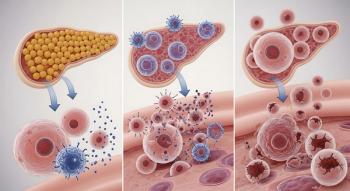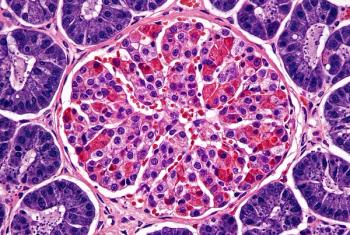
Mouse Study Shows Psoriasis Drug Sotyktu Could Treat Type 1 Diabetes
Researchers have found that Sotyktu, which inhibits the protein TYK2, protects insulin-producing beta cells and, at the same time, is able to reduce inflammation.
New research in mice has found that blocking the protein tyrosine kinase 2 (TYK2) reduced inflammation in the pancreas, leading researchers to suggest this could be a new strategy to prevent or slow type 1 diabetes.
Researchers at the Indiana University School of Medicine found that blocking TYK2 protected the beta cells in the pancreas but also reduced the immune system's attack on those cells, according to findings
“Our study showed that targeting TYK2 could be a powerful way to protect insulin-producing beta cells while calming inflammation in the immune system at the same time. This finding is exciting because there is already a drug on the market that does this for psoriasis, which could help us move more quickly toward testing it for type 1 diabetes,” Carmella Evans-Molina, M.D., Ph.D., co-author of the study and director of the Indiana Diabetes Research Center and the Eli Lilly and Company Professor of Pediatric Diabetes at the IU School of Medicine, said in a news release.
Past genetic studies have already shown that people with lower TYK2 activity are less likely to develop type 1 diabetes. In this new study, researchers looked at both human cells and work in mice to define how two drugs that inhibit TYK2 could mediate the crosstalk between the immune system and beta cells.
“Our preclinical models suggest that the treatment might work in people as well,” said lead author Farooq Syed, Ph.D., assistant professor in the Department of Diabetes-Immunology at the Arthur-Riggs Diabetes and Metabolic Research Institute of the City of Hope.
Syed and his colleagues tested the effects of BMS-986165 and BMS-986202 in three human model systems and then determined the impact of BMS-986202 in two mouse models of type 1 diabetes.
Researchers found that both therapies modulated three critical nodes in type 1 diabetes pathophysiology. The first is through immune cell activation and target tissue infiltration; the second is through beta cell inflammation and survival; and the third is direct interaction of beta cells with antigen-specific CD8+ T cells.
“Taken together, these data provide robust rationale for testing the effectiveness of TYK2 inhibitors in clinical trials to prevent and/or delay the development of T1D,” researchers wrote.
Syed said in a news release that the next step is to initiate translational studies to evaluate the impact of TYK2 inhibition alone or in combination with other already approved drugs in people at risk or with recent-onset type 1 diabetes."
Type 1 diabetes is an autoimmune disease where the immune system destroys insulin-producing beta cells in pancreatic islets. About 2 million Americans have type 1 diabetes, according to the CDC.
This research was supported by the National Institutes of Health (NIH), Veteran Affairs (VA), and Breakthrough T1D.
Newsletter
Get the latest industry news, event updates, and more from Managed healthcare Executive.

























